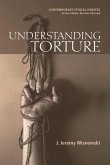Despite Victor Hugo's 19th-century proclamation that torture no longer exists, we still find it even now, even in those nations that claim to be paradigms of civility. Why is it that torture still exists in a world where it is routinely regarded as immoral? Is it possible to eliminate torture, and if so, how? What exactly does it mean to call something 'torture', and is it always morally reprehensible? Arguments in favour of torture abound, but in this book, the author examines and explains the moral dimensions of this perennial practice, paying careful attention to what lessons torture can teach us about our own moral psychology. By systematically exposing the weaknesses of the dominant arguments for torture, drawing on resources in both analytic and continental philosophy and relevant empirical literature in psychology, he aims to provide an over-arching account of torture: what it is, why it is wrong, and why even the most civilized people can nevertheless engage in it.
It would be misleading to say one will 'enjoy' reading this book, given the grimness of the topic. However, what one can enjoy is the astonishing accessibility of the writing as Wisnewski sets out the best and most systematic arguments I have read against torture. One does indeed understand torture, in all of its dimensions, far better after confronting this truly valuable book. Sanford Levinson, editor of Torture: A Collection Contemporary Ethical Debates General Editor: Brenda Almond, Emeritus Professor of Moral and Social Philosophy, University of Hull Understanding Torture surveys the massive literature surrounding torture, arguing that, once properly understood, there can be no defence of torture in any circumstances. By exploring the history, psychology, and politics of torture-as well as the current philosophical defences of it-Wisnewski provides a comprehensive account of why torture ought to be categorically rejected . J. Jeremy Wisnewski is an Associate Professor of Philosophy at Hartwick College. He is the author of numerous books and articles in moral philosophy, phenomenology, and the philosophy of social science .
Hinweis: Dieser Artikel kann nur an eine deutsche Lieferadresse ausgeliefert werden.
It would be misleading to say one will 'enjoy' reading this book, given the grimness of the topic. However, what one can enjoy is the astonishing accessibility of the writing as Wisnewski sets out the best and most systematic arguments I have read against torture. One does indeed understand torture, in all of its dimensions, far better after confronting this truly valuable book. Sanford Levinson, editor of Torture: A Collection Contemporary Ethical Debates General Editor: Brenda Almond, Emeritus Professor of Moral and Social Philosophy, University of Hull Understanding Torture surveys the massive literature surrounding torture, arguing that, once properly understood, there can be no defence of torture in any circumstances. By exploring the history, psychology, and politics of torture-as well as the current philosophical defences of it-Wisnewski provides a comprehensive account of why torture ought to be categorically rejected . J. Jeremy Wisnewski is an Associate Professor of Philosophy at Hartwick College. He is the author of numerous books and articles in moral philosophy, phenomenology, and the philosophy of social science .
Hinweis: Dieser Artikel kann nur an eine deutsche Lieferadresse ausgeliefert werden.








